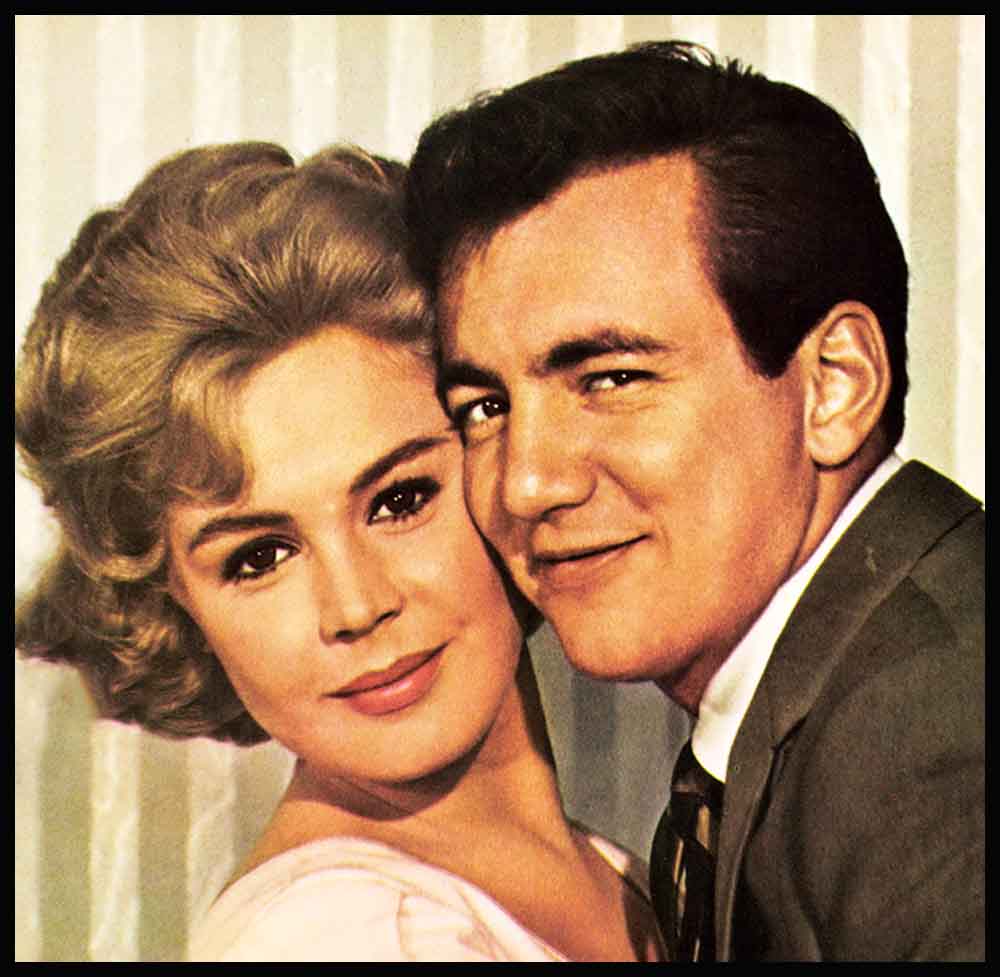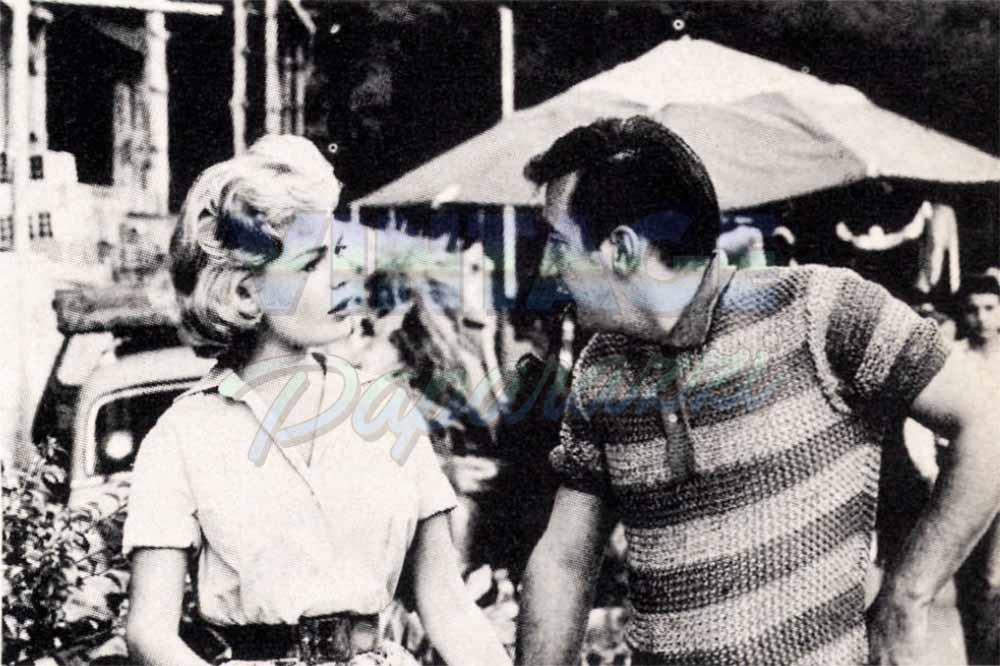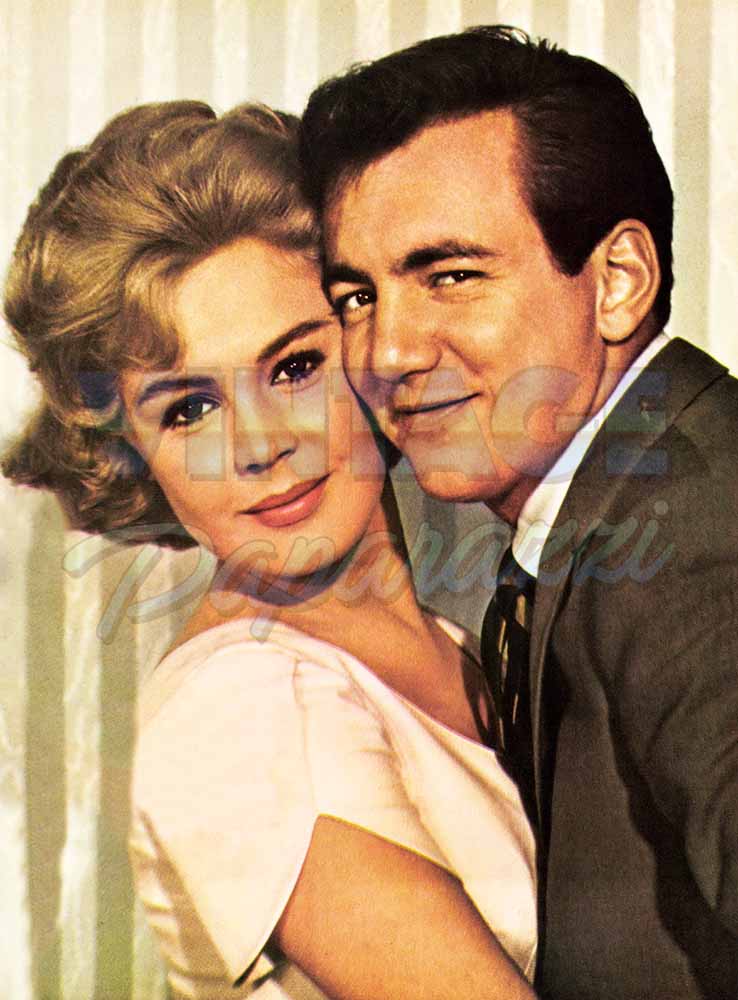
Yes, Love Can Be A Dream
LOVE CAN BE A TERRIBLE THING,
This is the story of a girl who lived a fairy-tale existence with no problems until she decided to put childish things behind her and get married. Today, as a married woman of five months, her life has become a torment because the three people she loves most— and who love her most—have put her in an impossible position.
Who are these three people and what is their relationship to Sandra Dee?
It all started at four a.m. on a cold Friday morning last December 2nd, when Judge Samuel Lohman pronounced Sandra Dee the wife of Bobby Darin. For Bobby, that moment was one he had dreamed of all his life. Now, it had become reality. As he kissed his young bride gently on the lips, he held her tightly for a moment and his mind raced. The long search was over. At last, he had found the girl he could love; the girl who would love him back. And now she Mas his own.
Love Mas the most sacred of all the rules set down in Bobby’s little black book of life. ”You can cheat here and there on things that don’t mean that much to you, but the woman you love and make the mother of your children is someone you never disregard or take for granted!”
Almost from the moment he met Sandy in Rome, Bobby knew that she was the girl for him, but it took him some time to convince Sandy that he Mas the guy for her. Bobby formulated a well-calculated plan which, with the unsuspecting help of Sandy’s mother, Mary Douvan, he slowly hut surely executed. As Sandy slowIy succumbed, they sat for hours and hours discussing everything. Actually, it Mas Bobby who did most of the talking and Sandy just sat there listening to his thoughts on love, politics, religion, their future, ete.
As Bobby told her all about the hardships of her career, Sandy nodded her head. If she didn’t quite understand all of it at that moment, she didn’t let Bobby know. She figured there was still time to work everything out properly. There was only one thing that bothered her. Where did she, Sandra Dee, fit into Bobby’s scheme?

LOVE CAN BE A DREAM
She was relatively inexperienced where romance was concerned, and all she really knew about the magical word ”love” was from Scripts that she had worked with. It wasn’t much of a background, but it was enough for her to know that there was no substitution in the world for love. She knew that no matter how much she thought she wanted a career, she wanted a man to love her even more— someone who’d be a father, brother, husband, friend and lover all rolled into one. It was important to have someone all her own. She’d never really had a close friend to whom she could confide things. There was only her mother—Mary Douvan—a pert, chic young woman whose greatest ambition was to make sure her daughter got everything she never had!
No, there was no reason to ask Bobby about her career. But as they talked one evening,
Bobby told her where she fitted into his plans. ”You know, Sandy, to me there’s no one like you,” he said.
”You’re the only young actress in my world, and I want it to be just that way. If you want to work after we’re married, you can—even if we have kids. But you’ve got to promise me that they won’t be raised entirely by some nutty governess or maid.” Then he laughed and said, ”Maybe you’ll love being married to me so much that you won’t even think of working. Maybe just a flick a year! Hey, precious, what do you say to that?”
“Well, Mr. Cassotto,” Sandy teased. . . .
”Hey, that sounds pretty good. Now do you know how to spell it, my future Mrs. Cassotto? . . . C’mon spell it for me.”
”Oh, Bobby, stop kidding me,” she replied, embarrassed. ”You tell me how to spell it every single day. How can I forget?”
”Don’t ever forget it,” he said, suddenly taking on a serious note. “My name is something I don’t fool around with, Sandy. It’s the only thing that really belongs to the real me. I hope you’ll be number two!”
Forget it, silly. I’m only joshing with you. But you know, Bobby, I wonder what my mother will think about us getting married—or Ross. I worry about them all the time. They mean so much to me . . . but I wonder if they’ll really understand. . . .”
For the first time, Sandra Dee had a real problem. She had never known what problems were before. To her, life had been a sheltered home filled with love, comfort and devotion. Her stepfather, Eugene Douvan, was a wealthy man who never stinted with the dollars where his wife or stepdaughter. Whom he later adopted, were concerned. He put his foot down on only one thing—when Sandy, as a little girl, asked if she could become a model, he said: ”That kind of life isn’t for my baby. Believe me, Sandy, I’ve been out in Hollywood. and I know the advertising world. It’s rough, honey. Much too rough. You’d never be happy with it.” (In this respect. Bobby reminded her of Papa.) The modeling career was dropped— for the time being. However, Sandy was a stubborn girl, and she knew that someday she’d be able to convince him to allow her to try her hand at it. Finally, when she was 13, her mother hacked her and Sandy became a model.
Mary Douvan was determined that her daughter would make a go of it, and began guiding her daughter in her career. With her first cover, Sandy made a splash and became a success in the modeling world. Unfortunately, in the modeling business—as in show business—there is very little time for fun and a normal childhood. There were private tutors and camera sittings and appointments and people to see and more jobs than she knew how to handle. But Mary was always there to manage.


In the years that followed, Mary Douvan and her daughter became inseparable. When Mr. Douvan passed away, they became even closer than before. If Sandy hadn’t been so busy with her flourishing career. perhaps she would have realized that their closeness wasn’t the best thing in the world for her. Both became too dependent upon each other. For Sandy, there was nothing to do except look pretty—Mama took care of everything. For Mary, there was nothing in the world but to make sure that her Sandy would become a ”somebody.”
When Sandra was discovered for the movies and brought to Hollywood by producer Ross Hunter, another shoulder to lean upon became available.
Life became a fantasy world for Sandra. All she had to do was ask for something and it was hers. When she went under contract to Universal-International, the studio was placed at her disposal. If she didn’t feel like driving, there was a chauffeur to take her and Mama anyplace they wanted to go. If there was a particular dress Sandy wanted but her private budget couldn’t afford, Mama made sure that the studio got it for her.
For Mary Douvan, everything was working out just as she had dreamed. Her daughter was becoming a big movie star, and everything was perfect. Now, she was convinced that nothing could stop them. Never once did she let Sandy forget that she ıvas a star. It was important, even on Saturday and Sunday, to be dressed like a star, to act like a star. Sometimes, Sandy couldn’t understand why, early on Saturday morning, the hairdresser or the make-up man from the studio would arrive at home to fix her up. She’d say to her mother, ”Why today? Can’t I have any rest? No one’s Corning here to see me. Please, Mother, let me be myself for just one day out of the week!”
But Mary would somehow always win, and Sandy would sit reluctantly for hours while the hairdresser set her hair in rollers and the make-up man carefully applied her make-up. She didn’t want any arguments between her mother and herself. She loved her mother deeply, but was unable to make her understand that, occasionally, she would like to make a decision for herself.
Mary did everything. She collected Sandy’s paychecks, paid all the bills, bought all their necessities—and luxuries. Sandy was just a ”doll” whose job it was to act occasionally and look pretty all the time—nothing more. Her mother made all the decisions.
It was even Mary Douvan who first tried to convince Sandy she’d misjudged Bobby Darin. One night in San Margherita, she told Sandy, ”You’ve never judged people before by what anyone else has to say. Why are you listening to all those rumors about Bobby Darin? Give him a chance. honey. You’ll see, you’ll like him a lot.”
Later, when Bobby kidded Mary by saying, ”Marushka, I’m gonna marry your daughter,” she laughed it off as one of his witticisms, and retorted, ”You and a thousand other guys!” It never dawned on her that the boy she had befriended would become the biggest threat to her personal happiness, or that for the first time, Sandy would make a major decision on her own.
When Sandy made her decision to marry Bobby, there ıvas no ıvay to breach the gap with her mother.
Mary steadfastly refused to come to the wedding. When asked why, Mrs. Douvan calmly said. ”When someone tells you they’re eloping, you just don’t expect to be invited to an elopement party. Would you?”
”But it ıvas your daughter, Mrs. Douvan!” a reporter said.
”I know it was, but I want you and everyone else to know I wasn’t angry with her eloping—just slightly hurt. I felt two stars of their magnitude shouldn’t have to elope, but should let everyone share in this great happiness. They could have waited. Besides, I had no idea they really were going to elope. When Sandy and I went to New York, it was because Bobby was going to play a night club there, and since Sandy wasn’t working on a picture, I thought it wise that the kids have a chance to spend time together and get to know each other better. I had no idea they were planning to marry. The only marriage date I heard about was some time in January when Bobby would be playing the Copacabana, and Sandy thought they might marry in New York. The whole thing was really too rushed for me to form atıy opinions.”

The ensuing clash between Bobby and Mary was incomprehensible to all three of them. Bobby couldn’t understand why Mars seemed to have turned against him: Sandy wanted her husband to be happy, but she also wanted to please her mother. Mary, on the other hand, felt betrayed because she hadn’t been consulted.
According to Sandy. every time Mart visited Bobby’s and her home in Bel Air, when Bobby wasn’t around, she’d jab at the fact that she thought Sandy was pregnant. ”I can tell, Sandy,” she’d say. ”There’s something in your eyes, the way you’re walking, the way you’re speaking to me. If yon are, you’re not very clever. A marriage is difficult to adjust to by itself, and having a baby only means an added burden. I hope you’ll wait and not rush into things like you did your mar . . .” and she would stop herself abruptly.
Then Sandy would cry, “But l’m not pregnant, Mother. Believe me. I know what l’m doing. Please don’t confuse me. Trust me—trust Bobby. We want children—I want a baby. You’ll never know how much I want a baby for my very own. And if one comes, we’ll not be sorry. We’ll be terribly happy and you will, too.”
“But what about your career, Sandra? Are you going to give it up? Don’t forget you owe a lot to a great many people. The studio has been good to you, and, of course. you can’t forget Ross Hunter. He’s been your best friend. He’d do anything for you. Sandy. Just remember. You can’t let Ross donw!”
Of course, Sandra couldn’t let Ross Hunter down. It was Ross who found her and helped make it all possible. She was indebted to him, and because she had been brought up never to forget people who are good to you. Sandy never would forget Ross. But to say that she owed him everything wouldn’t be true either. As Sandra had succeeded with her career, so had Ross with his—and mainly with pictures starring Sandra.
Nevertheless, Sandy knew that when she married Bobby, it was a shock to Ross. The fledgling had developed wings. lf Ross wondered if Sandy was perhaps too young (knowing in his heart that she was immature and inexperienced), he never said so. To the public, he announced how happy he was for this wonderful couple and told everyone he was planning a wedding party for them as soon as they returned home. ln fact, he was the first person to be invited to their home for dinner when they returned to Hollywood. And it was Ross who called Mary Douvan the following day and said, ”Mary, you should see them. They’re just wonderful together. They’re so happy!”
But Sandy received another impression. She wasn’t sure how happy Ross really was. She couldn’t figure out why he would run onto the Tammy, TelI Me True set several times a day, stop the cameras, and run over to her to say, ”I miss you, honey. How do you feel? How’s Bobby? What’s happening? Are you happy?” And before she could answer him, he’d continue, ”By the way, why don’t you come out with me to dinner tonight? It’s an important party!”
When she’d look up at him, her big, brown eyes puzzled because she knew that her answer had to be, ”But l’m going home to my husband tonight,” she’d feel all torn apart inside. She didn’t want to say ”no” to Ross, yet she knew she had to because she was married and her first obligation was to her husband.
Why can’t he understand, she’d say to herself? Why must I tell him ”no?” Why must I tell my mother I have a husband now who’s helping me make decisions. Why can’t they understand that l’m not disobeying them, but that I must make my own decisions.
But the answers just didn’t come. What came instead was confusion. When Sandy left the studio for the warmth of Bobby’s arms, all she could really bring him was an unhappy State of mind.
You’d have to be a pretty insensitive guy not to realize that something was bothering your wife tremendously when she’d walk into the house with a false smile. And when you’d ask her, ”What’s up, honey?” she’d turn around and blurt out, ”I had to tell Ross ‘No’ tonight, and Mother and I had a quarrel on the phone again.” All this made Bobby more resentful of the fact that his wife was a working woman, and that these two people, who claimed to love her so much, were unconsciously making her miserable. Bobby had wanted a woman who would be his. He wasn’t a selfish person. He hadn’t said to Sandy, ”Give up your mother and Ross!” He was willing to share. The only thing he wouldn’t stand for was seeing his wife thrown constantly into a dark pit of confusion.
They made everything so difficult for her and forced her into situations for which there was no solution without hurting someone. The situation finally came to a head one Sunday afternoon in Las Vegas. at the Flamingo Hotel. Bobby, Sandy and a group of friends sat around the bungalow playing cards and listening to music. No one said a word. It seemed Bobby’s disease was catching. He had lost his voice and was unable to speak. This situation had occurred several times before, but with a day’s rest, Bobby had always gotten back in good shape. But this time was different. Two days had gone by, and instead of getting better, Bobby’s throat got worse. For the first time, Bobby seemed worried. As time dragged on, Sandy was torn between concern for her husband and concern for her job. In a little while, she’d have to head back to Hollywood, since she had an early call for Tammy Tell Me True. She didn’t want to leave, but obligation stared her in the face. She knew if she could only get through this picture, she’d be okay. It would be a long time before she’d tackle another one—even though Ross Hunter was asking her every day for a starting date on Chalk Garden, her next film. And every day, she’d kid him and tell him, ”Tomorrow, Ross. I might tell you tomorrow.” But Ross Hunter was wondering if there’d be a tomorrow. He feared those rumors about Sandy being pregnant might be true. Was he going to lose his star to motherhood? And so, every day, he’d press a little harder.
Sandy was looking forward to the end of the picture so she could be with Bobby. And perhaps there would be no more of these separations. Sandy certainly hoped not.
By 7 o’clock, Bobby was in pretty bad shape, and while he tried to hide his concern from Sandy and also the fact that two specialists from Los Angeles were flying up, somehow you can’t hide these things from a woman who is in love and concerned about her husband.
Sandy decided to check to see if there was a later plane. A phone call to the airport proved there was a flight leaving at 4:30 in the morning. If she made that one, no one need ever know that she didn’t take the 9 p.m. one she was originally scheduled for. She’d still be at the studio in plenty of time for her early call. She wouldn’t even have to call Ross to tell him she would be late. Bobby was relieved that Sandy was staying a little while longer.
At II p.m., the phone rang in the bungalow. The 4:30 flight wouldn’t be in on time. Snow storms in Minneapolis had canceled the flight. Sandy was most upset. ”What am I going to do? I’ll have to hire a car and drive to L. A. . . . I’ve just got to get there.”
”No, you don’t,” Bobby rasped desperately. ”Call Ross and tell him you’ll be late. Every star is entitled to be late to the studio once in her life. Have you ever been late before, Sandy?”
”No,” she nodded, ”but Bobby, he won’t understand. I can’t do this to Ross. I’ve got to get out of here. I’ve never been late in my life to the studio, and I don’t want to start now!”
”Well, l’m not going to let you drive,” Bobby said. ”You haven’t had any sleep and it’s a long, long drive. Sandy, nothing will happen. Just phone Ross and tell him you’ll be late.”
“I can’t, Bobby. Believe me, if I could, I would. If you won’t call a car, I’ll have to get one myself.”
Bobby was too exhausted to argue any further. He retired to the bedroom and just then the two doctors from L. A. arrived and began to examine Bobby.
I tried to reason with Sandy, but all she could say was, ”What will I tell Ross. He’ll never really understand.”
”If you tell him the truth, you have nothing to be afraid of,” I insisted. ”After all, if he really loves you the way he says he does, he’ll realize your predicament. He’s not a heartless man.”
”But what if he doesn’t. What if he tells me that I should have listened to him and not come up here. What’II my mother say when she finds out?”
“Would it be better if you weren’t here when Bobby really needs you now? Grow up, Sandy. You’re a married woman now. Just remember, if you’ve done nothing wrong, you’ll never get in trouble. Now here,” I said, handing her the phone. ”Call Ross and tell him the whole story.”
Shaking from head to toe, Sandy asked for the Beverly Hills operator.
Moments later, she was speaking calmly into the phone, “Ross, this is Sandy. I have a little problem. . . .” And she went on to relate her predicament. What was said on the other end of the phone, I don t know, but it was obvious that Sandy was having a difficult time trying to explain to Ross. She had to repeat over and over, ”But I couldn’t Ieave him, Ross. He’s sick and he’s my husband.”
After 15 minutes of conversation, she hung up the phone and sighed deeply. ”lf he doesn’t understand now, he never will.”
Moments later, the doctors came out of the bedroom.
“Is he all right? What s wrong with him?” she asked.
“Nothing to worry about. He’ll be all right,” one of the doctors said. ”I think both of you need some rest. You can go in and see him now if you want to.”
Almost before he finished speaking, Sandy was inside. She closed the bedroom doors, but through the paper-thin walls, I could hear Bobby croak, ”You see, honey, I told you there was nothing to worry about. I knew Ross would understand. Just listen to me, honey, and you’ll be all right.”
“I want to, Bobby … I really want to,” Sandy sighed.
How Sandra Dee will solve her problem. I have no idea. lt’s not an easy task when the three people you love most keep tugging at you in different directions. Naturally, there is some right on all three sides—four, if you count Sandra, and she contributes to the problem, also—but Sandy’s happiness is at stake here, and I think she is the one who must make the decisions involving her marital happiness.
With time and patience, she can make her mother, Ross Hunter and her husband understand the problem she faces and perhaps even talk them into helping her solve it.
Somebody must do something, for it’s an untenable situation all the way around, which is tearing Sandra Dee to pieces.
—BY RONA BARRETT
It is a quote. MOTION PICTURE MAGAZINE JUNE 1961




